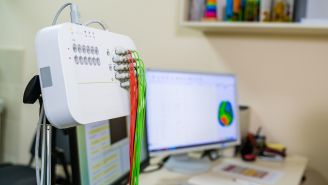We all know how easy it is to come home after a long day and plop down for some quality time with Netflix. But we’ve got some bad news for couch potatoes.
A study published in the journal Neurology has found that poor physical fitness in middle age is “directly correlated” to smaller brain size twenty years down the road. This means that a lack of exercise now could result in quicker brain aging later. And if you have heart disease, your brain could be aging even faster.
Physical fitness and brain aging
For the study, Boston researchers analyzed the treadmill tests of roughly 1,500 middle-aged people—all free of dementia and heart disease at the time—who had been enrolled in the Framingham Heart Study. Specifically, the scientists were interested in exercise capacity, or how long the participants were able to walk before their heart rates reached a certain level. Twenty years later, participants took treadmill tests again along with MRI brain scans.
The results: Those who struggled the most with the fitness test—the ones with lower exercise capacities as well as higher blood pressure and heart rates—showed a smaller brain volume 20 years later. For some, the smaller brain size was equal to one year of accelerated aging.
Of course, the study doesn't prove a direct cause-and-effect relationship, or that a smaller brain volume means poorer thinking. But the findings do add more fuel to what we already know: to stay strong in both body and mind, you gotta move.
Here are three more tips for keeping your brain in tip-top shape:
- Eat brain-boosting foods. Walnuts, blueberries, fish, leafy veggies, sunflower seeds, avocados and olive oil are all packed with nutrients that help promote clear thinking, improve memory and may help fend off Alzheimer’s disease. (Try these tasty recipes for better brain health.)
- Give it a workout. Your brain is just like other muscles in your body. It gets stronger when you work it out. Doing crossword puzzles, word games, reading, playing a musical instrument or learning a new language are all great ways to stay sharp.
- Get some sleep. One of the best things you can do for your brain is to get a good night’s rest. Adequate sleeps helps prevent cognitive decline and memory loss, and also improves our concentration during the day. Aim for seven to nine hours each night.






